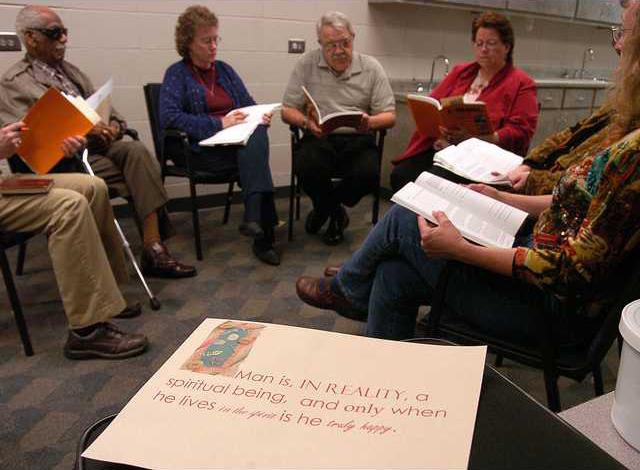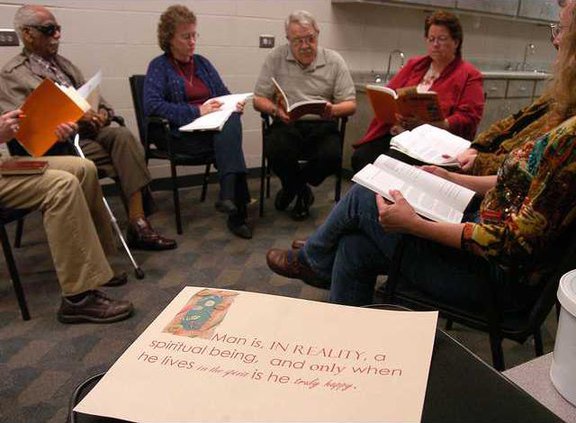The Baha'i faith is based on a stance of unity and equality, which may be why millions around the world have been attracted to the religion for the past 164 years, including some here in Hall County.
Baha'u'llah, who was born in Persia, or today's Iran, founded the religion in 1844, and now there are about 5 million members worldwide. He taught that all religions represent progressive stages in the revelation of God's will.
"Baha'is believe that Baha'u'llah is the divine messenger for this day and age," said Deborah Wood, editor and writer at the Baha'i National Center in Evanston, Ill. "We are working toward peace and unity in the world, and the way to establish this is through his covenant. It's heavily focused on unity and diversity and that all the peoples of the world are one and we all pray to the same god."
Bill Neiheisel, a Hall County Baha'i community member, agreed that the unity of mankind is one of the main focuses of the faith.
"That is why I became a Baha'i," he said. "I felt like the only way for man to come together as one and for us to have peace in the world was to have world unity and we had to do it through religion, not politically."
The Hall County Baha'is are not a very large group, but they are dedicated to their faith and spreading ideals of oneness, peace and equality throughout Gainesville and other local communities.
"We are just below nine right now and we don't really have a group to have a spiritual assembly right now, but that is temporary," said Neiheisel, who added that each group must reach nine members to have a spiritual assembly. "We've been here 20 years in this area, my wife and I, we live in Oakwood and we are actually a separate Baha'i group in Oakwood." There must be nine active members to have a spiritual assembly, which means enough members to hold elections.
Worldwide, the Baha'is believe that Baha'u'llah was the most recent divine messenger of God. They also believe that Abraham, Zoroaster, Moses, Krishna, Buddha, Jesus and Muhammad also were divine messengers revealing a plan to bring the kingdom of God on earth.
Baha'u'llah became a follower of Bab, a divine messenger according to the Baha'is, in 1844. But soon after the followers of Bab were persecuted for their beliefs, Baha'u'llah was then imprisoned and exiled from Persia, according to the international Web site of the Baha'i faith.
During Baha'u'llah's time of exile he produced hundreds of writings, which are sacred scripture today to the Baha'is. Some of the sacred books that the Baha'is read during their study circles, devotional services and the Baha'is holy 19-day feast include "The Tablets of Baha'u'llah" and "The Hidden Words," along with books of high prayers.
"(In study circle) there's a series of seven books that we read, and they do this all over the world; in Africa and China they are using the same books," said facilitator Lea Danielsen. "Each one is around a theme, there are some that are designed around living a spiritual principle, some are designed toward teaching children or youth. We go through the book and we study about the history of the principles in the Baha'i faith and Baha'u'llah, who is the divine founder of the faith."
In following the faith's idea of oneness and equality there are no clergy and each Baha'i community is governed by a local body. There also is a national governing body in Evanston, Ill., and the international governing body, called the Universal House of Justice, is located in Haifa, Israel.
"We have a local spiritual assembly and we get together every 19 days for feast and that is when we go over the affairs of the community," Neiheisel said. "During feast we come together and say prayers, and then we have a meeting and we discuss the affairs of the community ... and when we have an assembly we actually have officers of the assembly present things and help govern things."
Upcoming for the faith is the Festival of Ridvan, which begins April 21 and runs through April 29. The holy days are a celebration of Baha'u'llah declaring he was the divine messenger of his time.
"(Baha'u'llah) was in Baghdad at the time and he was going to be exiled to yet another place, and so there was a garden that he named Ridvan, which means paradise in Persian," Wood said. "He went there and that is when he declared he was the latest manifestation of God. And his followers came to the garden and he gave them the news."
During the Ridvan celebration each community can choose how to honor Baha'u'llah, but they also have elections during the festival period.
"That is when the communities around the world vote - there is no campaigning going on - we say prayers in a spiritual atmosphere," Neiheisel said.

